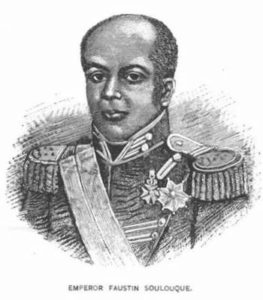
Faustin Soulouque
*Faustin Soulouque was born on this date in 1782. He was a Black Haitian politician and military commander.
Faustin-Élie Soulouque was born in Petit-Goâve, a small town in the French colony of Saint-Domingue, to a slave mother, Marie-Catherine Soulouque. She was a Creole of ethnic Mandinka descent. Soulouque was freed because of a 1793 emancipation decree that abolished slavery in response to the Haitian Revolution of 1791. Soulouque enlisted in the black revolutionary army in 1803 as a free citizen.
He fought until Saint-Domingue achieved independence as Haiti. Soulouque was commissioned as a lieutenant in the Haitian Army in 1806 and made aide-de-camp to General Lamarre. In 1810, Soulouque was a Horse Guard under President Alexandre Pétion and served in the Haitian military for the next four decades. Soulouque was finally promoted to the highest command in the Haitian army, attaining the rank of lieutenant general and Supreme Commander of the Presidential Guards under then-President Jean-Baptiste Riché. In 1847, President Riché died.
Soulouque, aged sixty-five, was enticed to accept the role offered him as Haiti's 7th President, taking the Presidential Oath of Office on March 2, 1847. At first, he seemed to fill the puppet position well. Still, within a short time, Soulouque rejected his backers and began to consolidate himself as the absolute ruler of Haiti. According to the book A Continent of Islands: Searching for the Caribbean Destiny by Mark Kurlansky: "He organized a private militia, the Zinglins, and proceeded to arrest, kill, and burn out anyone who opposed him, especially mulattoes, thus consolidating his power over the government." Soulouque's power consolidation saw increased racial discrimination in favor of Haiti's black population, including a massacre of the mulattoes in Port-au-Prince on April 16, 1848.
Soulouque invited Blacks from Louisiana to emigrate to Haiti at the country's expense. Emile Desdunes, an Afro-Creole from New Orleans, arranged free transportation for at least 350 desperate evacuees. Many of these migrants later returned to Louisiana. Soulouque placed heavy restrictions on all opposition, and a wave of violence against potential rivals led to numerous murders. His open adherence to Vodou, a highly stigmatized syncretic religion, contributed to his violent reputation in the predominantly Roman Catholic country.
In 1858, a revolution against Soulouque was led. In December of that year, he defeated his army and seized control of most of Haiti. On the night of December 20, 1858, Soulouque left Port-au-Prince in a small boat. The Republic of Haiti was re-proclaimed, and the Constitution of 1846 was adopted. As a result, Soulouque abdicated his throne on January 15, 1859. Refused aid by the French Legation, Soulouque was exiled aboard a British warship on January 22, 1859.
Soon afterward, Soulouque and his family arrived in Kingston, Jamaica, where they remained for several years. Some records claim that he died in Kingston. Still, according to Haitian historian Jacques Nicolas Léger's book Haiti, her History, and her Detractors, Faustin Soulouque died on August 3, 1867. He was the last Haitian head of state to have participated in the Haitian Revolution, the last born before independence, and the last ex-slave.